Higher National Certificate/Diploma in Business Assignment Brief (RQF) ASSIGNMENT BRIEF
VerifiedAdded on 2021/09/18
|6
|1819
|203
AI Summary
School of BUSINESS & MANAGEMENT Assignment Brief (RQF) ASSIGNMENT BRIEF (RQF) Higher National Certificate/Diploma in Business Student Name/ID Number: Unit Number and Title: Unit 11: Research Project Unit Assessor: Assignment Title: Research Project Issue Date: Submission Date: Internal Verifier Name: Date: SUBMISSION FORMAT: The submission of assignment is in the form of an individual written report. This will enable students to explore and examine a relevant and current topical aspect of business
Contribute Materials
Your contribution can guide someone’s learning journey. Share your
documents today.
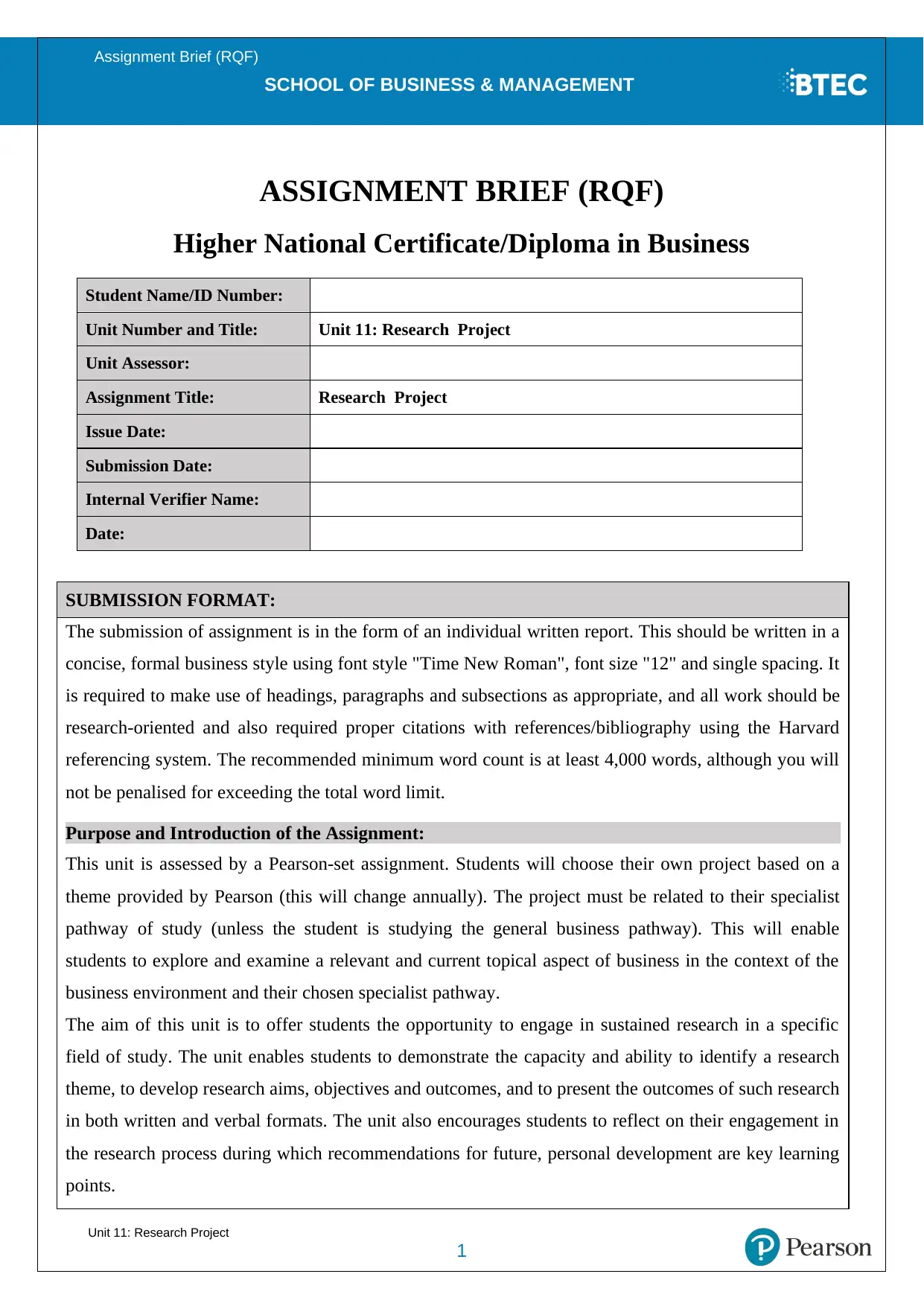
SCHOOL OF BUSINESS & MANAGEMENT
Assignment Brief (RQF)
ASSIGNMENT BRIEF (RQF)
Higher National Certificate/Diploma in Business
Student Name/ID Number:
Unit Number and Title: Unit 11: Research Project
Unit Assessor:
Assignment Title: Research Project
Issue Date:
Submission Date:
Internal Verifier Name:
Date:
SUBMISSION FORMAT:
The submission of assignment is in the form of an individual written report. This should be written in a
concise, formal business style using font style "Time New Roman", font size "12" and single spacing. It
is required to make use of headings, paragraphs and subsections as appropriate, and all work should be
research-oriented and also required proper citations with references/bibliography using the Harvard
referencing system. The recommended minimum word count is at least 4,000 words, although you will
not be penalised for exceeding the total word limit.
Purpose and Introduction of the Assignment:
This unit is assessed by a Pearson-set assignment. Students will choose their own project based on a
theme provided by Pearson (this will change annually). The project must be related to their specialist
pathway of study (unless the student is studying the general business pathway). This will enable
students to explore and examine a relevant and current topical aspect of business in the context of the
business environment and their chosen specialist pathway.
The aim of this unit is to offer students the opportunity to engage in sustained research in a specific
field of study. The unit enables students to demonstrate the capacity and ability to identify a research
theme, to develop research aims, objectives and outcomes, and to present the outcomes of such research
in both written and verbal formats. The unit also encourages students to reflect on their engagement in
the research process during which recommendations for future, personal development are key learning
points.
Unit 11: Research Project
1
Assignment Brief (RQF)
ASSIGNMENT BRIEF (RQF)
Higher National Certificate/Diploma in Business
Student Name/ID Number:
Unit Number and Title: Unit 11: Research Project
Unit Assessor:
Assignment Title: Research Project
Issue Date:
Submission Date:
Internal Verifier Name:
Date:
SUBMISSION FORMAT:
The submission of assignment is in the form of an individual written report. This should be written in a
concise, formal business style using font style "Time New Roman", font size "12" and single spacing. It
is required to make use of headings, paragraphs and subsections as appropriate, and all work should be
research-oriented and also required proper citations with references/bibliography using the Harvard
referencing system. The recommended minimum word count is at least 4,000 words, although you will
not be penalised for exceeding the total word limit.
Purpose and Introduction of the Assignment:
This unit is assessed by a Pearson-set assignment. Students will choose their own project based on a
theme provided by Pearson (this will change annually). The project must be related to their specialist
pathway of study (unless the student is studying the general business pathway). This will enable
students to explore and examine a relevant and current topical aspect of business in the context of the
business environment and their chosen specialist pathway.
The aim of this unit is to offer students the opportunity to engage in sustained research in a specific
field of study. The unit enables students to demonstrate the capacity and ability to identify a research
theme, to develop research aims, objectives and outcomes, and to present the outcomes of such research
in both written and verbal formats. The unit also encourages students to reflect on their engagement in
the research process during which recommendations for future, personal development are key learning
points.
Unit 11: Research Project
1
Secure Best Marks with AI Grader
Need help grading? Try our AI Grader for instant feedback on your assignments.
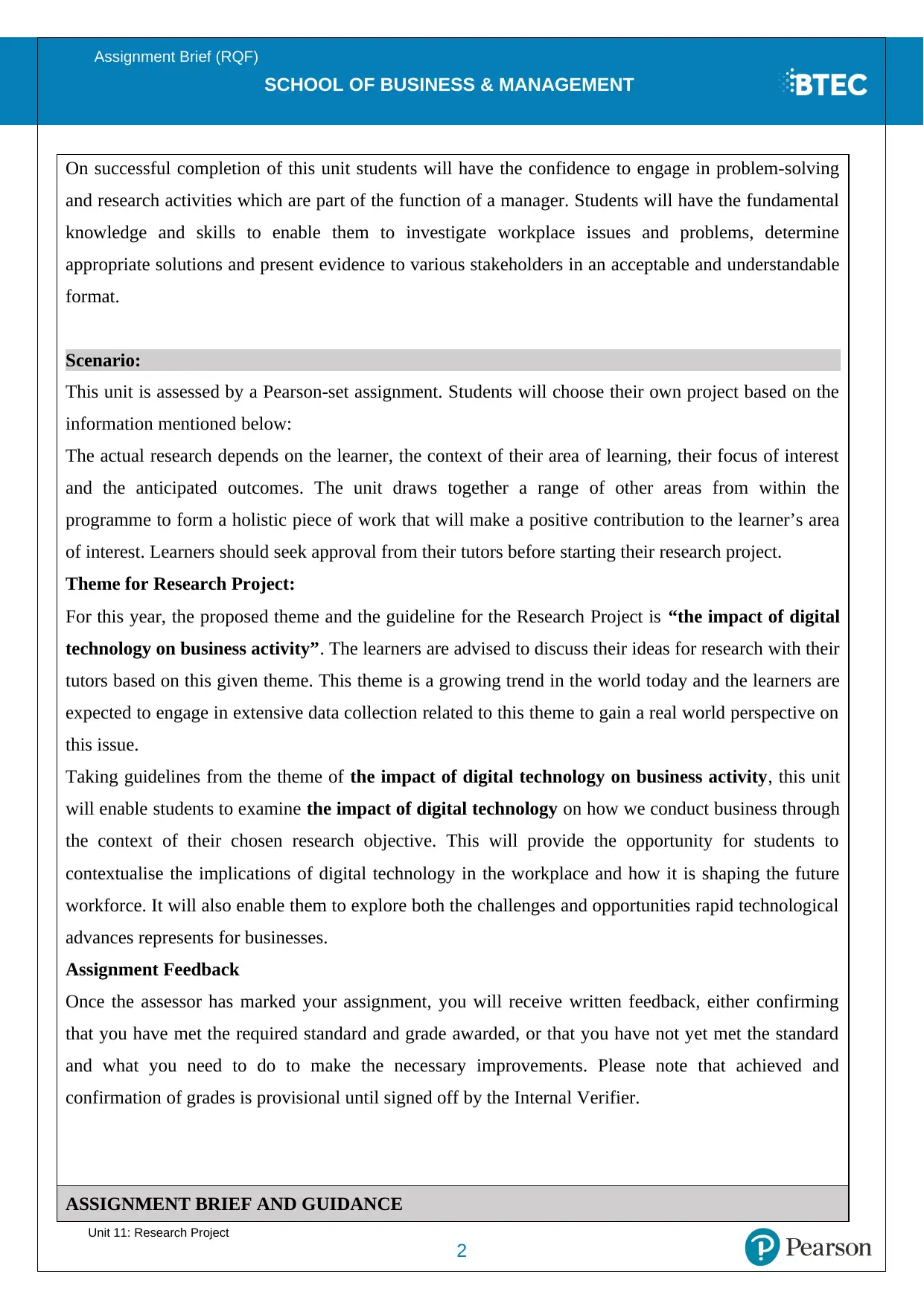
SCHOOL OF BUSINESS & MANAGEMENT
Assignment Brief (RQF)
On successful completion of this unit students will have the confidence to engage in problem-solving
and research activities which are part of the function of a manager. Students will have the fundamental
knowledge and skills to enable them to investigate workplace issues and problems, determine
appropriate solutions and present evidence to various stakeholders in an acceptable and understandable
format.
Scenario:
This unit is assessed by a Pearson-set assignment. Students will choose their own project based on the
information mentioned below:
The actual research depends on the learner, the context of their area of learning, their focus of interest
and the anticipated outcomes. The unit draws together a range of other areas from within the
programme to form a holistic piece of work that will make a positive contribution to the learner’s area
of interest. Learners should seek approval from their tutors before starting their research project.
Theme for Research Project:
For this year, the proposed theme and the guideline for the Research Project is “the impact of digital
technology on business activity”. The learners are advised to discuss their ideas for research with their
tutors based on this given theme. This theme is a growing trend in the world today and the learners are
expected to engage in extensive data collection related to this theme to gain a real world perspective on
this issue.
Taking guidelines from the theme of the impact of digital technology on business activity, this unit
will enable students to examine the impact of digital technology on how we conduct business through
the context of their chosen research objective. This will provide the opportunity for students to
contextualise the implications of digital technology in the workplace and how it is shaping the future
workforce. It will also enable them to explore both the challenges and opportunities rapid technological
advances represents for businesses.
Assignment Feedback
Once the assessor has marked your assignment, you will receive written feedback, either confirming
that you have met the required standard and grade awarded, or that you have not yet met the standard
and what you need to do to make the necessary improvements. Please note that achieved and
confirmation of grades is provisional until signed off by the Internal Verifier.
ASSIGNMENT BRIEF AND GUIDANCE
Unit 11: Research Project
2
Assignment Brief (RQF)
On successful completion of this unit students will have the confidence to engage in problem-solving
and research activities which are part of the function of a manager. Students will have the fundamental
knowledge and skills to enable them to investigate workplace issues and problems, determine
appropriate solutions and present evidence to various stakeholders in an acceptable and understandable
format.
Scenario:
This unit is assessed by a Pearson-set assignment. Students will choose their own project based on the
information mentioned below:
The actual research depends on the learner, the context of their area of learning, their focus of interest
and the anticipated outcomes. The unit draws together a range of other areas from within the
programme to form a holistic piece of work that will make a positive contribution to the learner’s area
of interest. Learners should seek approval from their tutors before starting their research project.
Theme for Research Project:
For this year, the proposed theme and the guideline for the Research Project is “the impact of digital
technology on business activity”. The learners are advised to discuss their ideas for research with their
tutors based on this given theme. This theme is a growing trend in the world today and the learners are
expected to engage in extensive data collection related to this theme to gain a real world perspective on
this issue.
Taking guidelines from the theme of the impact of digital technology on business activity, this unit
will enable students to examine the impact of digital technology on how we conduct business through
the context of their chosen research objective. This will provide the opportunity for students to
contextualise the implications of digital technology in the workplace and how it is shaping the future
workforce. It will also enable them to explore both the challenges and opportunities rapid technological
advances represents for businesses.
Assignment Feedback
Once the assessor has marked your assignment, you will receive written feedback, either confirming
that you have met the required standard and grade awarded, or that you have not yet met the standard
and what you need to do to make the necessary improvements. Please note that achieved and
confirmation of grades is provisional until signed off by the Internal Verifier.
ASSIGNMENT BRIEF AND GUIDANCE
Unit 11: Research Project
2
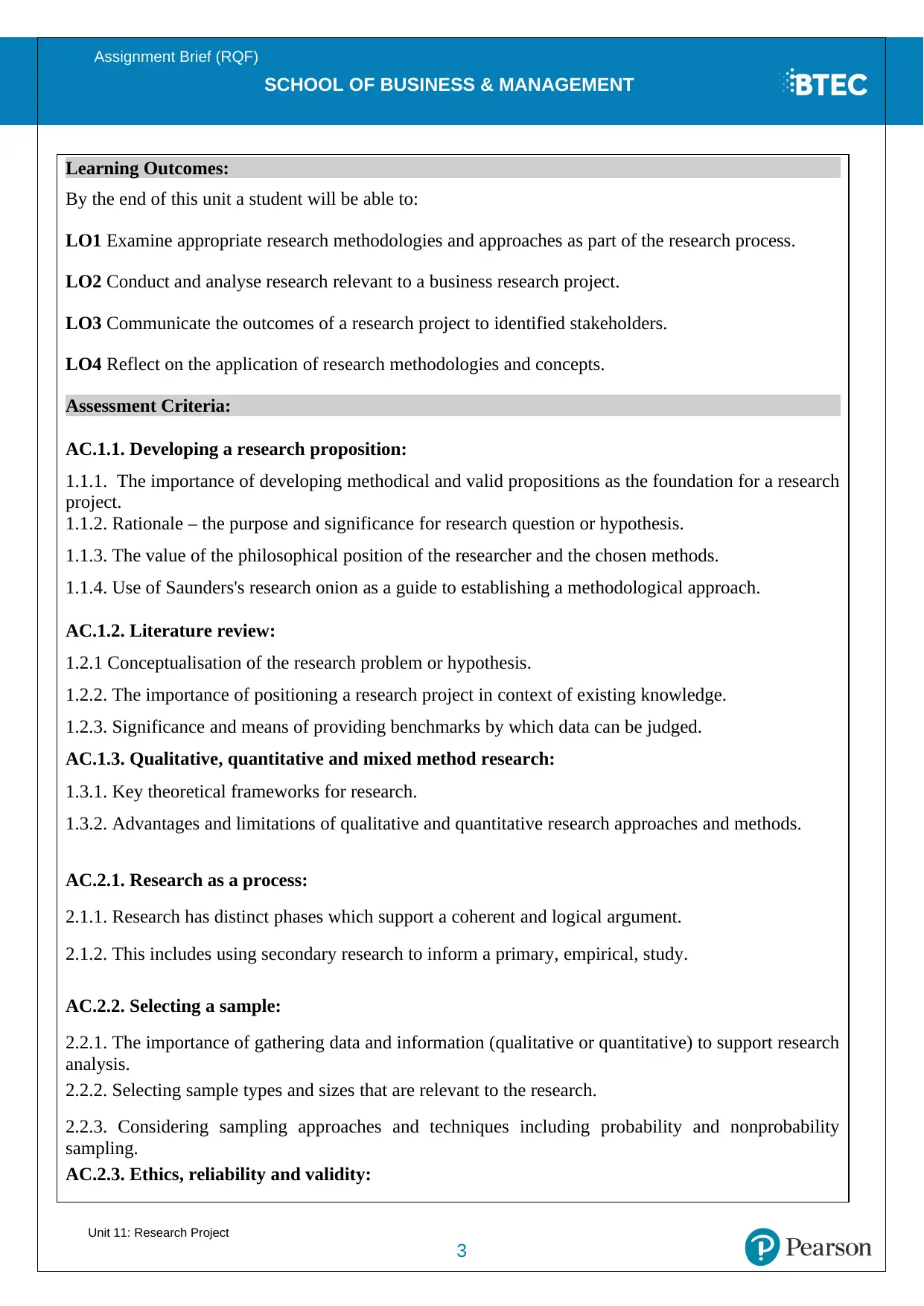
SCHOOL OF BUSINESS & MANAGEMENT
Assignment Brief (RQF)
Learning Outcomes:
By the end of this unit a student will be able to:
LO1 Examine appropriate research methodologies and approaches as part of the research process.
LO2 Conduct and analyse research relevant to a business research project.
LO3 Communicate the outcomes of a research project to identified stakeholders.
LO4 Reflect on the application of research methodologies and concepts.
Assessment Criteria:
AC.1.1. Developing a research proposition:
1.1.1. The importance of developing methodical and valid propositions as the foundation for a research
project.
1.1.2. Rationale – the purpose and significance for research question or hypothesis.
1.1.3. The value of the philosophical position of the researcher and the chosen methods.
1.1.4. Use of Saunders's research onion as a guide to establishing a methodological approach.
AC.1.2. Literature review:
1.2.1 Conceptualisation of the research problem or hypothesis.
1.2.2. The importance of positioning a research project in context of existing knowledge.
1.2.3. Significance and means of providing benchmarks by which data can be judged.
AC.1.3. Qualitative, quantitative and mixed method research:
1.3.1. Key theoretical frameworks for research.
1.3.2. Advantages and limitations of qualitative and quantitative research approaches and methods.
AC.2.1. Research as a process:
2.1.1. Research has distinct phases which support a coherent and logical argument.
2.1.2. This includes using secondary research to inform a primary, empirical, study.
AC.2.2. Selecting a sample:
2.2.1. The importance of gathering data and information (qualitative or quantitative) to support research
analysis.
2.2.2. Selecting sample types and sizes that are relevant to the research.
2.2.3. Considering sampling approaches and techniques including probability and nonprobability
sampling.
AC.2.3. Ethics, reliability and validity:
Unit 11: Research Project
3
Assignment Brief (RQF)
Learning Outcomes:
By the end of this unit a student will be able to:
LO1 Examine appropriate research methodologies and approaches as part of the research process.
LO2 Conduct and analyse research relevant to a business research project.
LO3 Communicate the outcomes of a research project to identified stakeholders.
LO4 Reflect on the application of research methodologies and concepts.
Assessment Criteria:
AC.1.1. Developing a research proposition:
1.1.1. The importance of developing methodical and valid propositions as the foundation for a research
project.
1.1.2. Rationale – the purpose and significance for research question or hypothesis.
1.1.3. The value of the philosophical position of the researcher and the chosen methods.
1.1.4. Use of Saunders's research onion as a guide to establishing a methodological approach.
AC.1.2. Literature review:
1.2.1 Conceptualisation of the research problem or hypothesis.
1.2.2. The importance of positioning a research project in context of existing knowledge.
1.2.3. Significance and means of providing benchmarks by which data can be judged.
AC.1.3. Qualitative, quantitative and mixed method research:
1.3.1. Key theoretical frameworks for research.
1.3.2. Advantages and limitations of qualitative and quantitative research approaches and methods.
AC.2.1. Research as a process:
2.1.1. Research has distinct phases which support a coherent and logical argument.
2.1.2. This includes using secondary research to inform a primary, empirical, study.
AC.2.2. Selecting a sample:
2.2.1. The importance of gathering data and information (qualitative or quantitative) to support research
analysis.
2.2.2. Selecting sample types and sizes that are relevant to the research.
2.2.3. Considering sampling approaches and techniques including probability and nonprobability
sampling.
AC.2.3. Ethics, reliability and validity:
Unit 11: Research Project
3
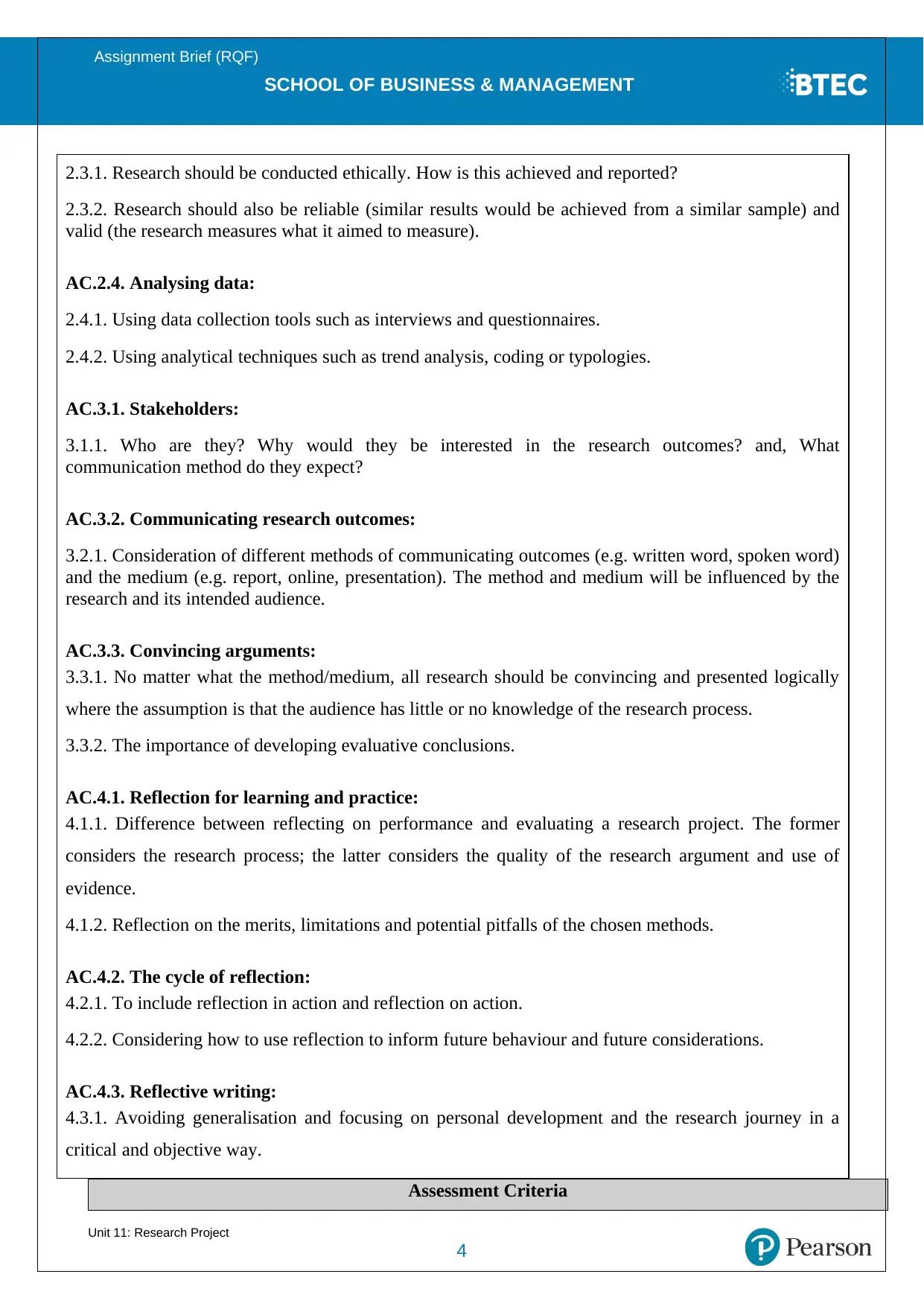
SCHOOL OF BUSINESS & MANAGEMENT
Assignment Brief (RQF)
2.3.1. Research should be conducted ethically. How is this achieved and reported?
2.3.2. Research should also be reliable (similar results would be achieved from a similar sample) and
valid (the research measures what it aimed to measure).
AC.2.4. Analysing data:
2.4.1. Using data collection tools such as interviews and questionnaires.
2.4.2. Using analytical techniques such as trend analysis, coding or typologies.
AC.3.1. Stakeholders:
3.1.1. Who are they? Why would they be interested in the research outcomes? and, What
communication method do they expect?
AC.3.2. Communicating research outcomes:
3.2.1. Consideration of different methods of communicating outcomes (e.g. written word, spoken word)
and the medium (e.g. report, online, presentation). The method and medium will be influenced by the
research and its intended audience.
AC.3.3. Convincing arguments:
3.3.1. No matter what the method/medium, all research should be convincing and presented logically
where the assumption is that the audience has little or no knowledge of the research process.
3.3.2. The importance of developing evaluative conclusions.
AC.4.1. Reflection for learning and practice:
4.1.1. Difference between reflecting on performance and evaluating a research project. The former
considers the research process; the latter considers the quality of the research argument and use of
evidence.
4.1.2. Reflection on the merits, limitations and potential pitfalls of the chosen methods.
AC.4.2. The cycle of reflection:
4.2.1. To include reflection in action and reflection on action.
4.2.2. Considering how to use reflection to inform future behaviour and future considerations.
AC.4.3. Reflective writing:
4.3.1. Avoiding generalisation and focusing on personal development and the research journey in a
critical and objective way.
Assessment Criteria
Unit 11: Research Project
4
Assignment Brief (RQF)
2.3.1. Research should be conducted ethically. How is this achieved and reported?
2.3.2. Research should also be reliable (similar results would be achieved from a similar sample) and
valid (the research measures what it aimed to measure).
AC.2.4. Analysing data:
2.4.1. Using data collection tools such as interviews and questionnaires.
2.4.2. Using analytical techniques such as trend analysis, coding or typologies.
AC.3.1. Stakeholders:
3.1.1. Who are they? Why would they be interested in the research outcomes? and, What
communication method do they expect?
AC.3.2. Communicating research outcomes:
3.2.1. Consideration of different methods of communicating outcomes (e.g. written word, spoken word)
and the medium (e.g. report, online, presentation). The method and medium will be influenced by the
research and its intended audience.
AC.3.3. Convincing arguments:
3.3.1. No matter what the method/medium, all research should be convincing and presented logically
where the assumption is that the audience has little or no knowledge of the research process.
3.3.2. The importance of developing evaluative conclusions.
AC.4.1. Reflection for learning and practice:
4.1.1. Difference between reflecting on performance and evaluating a research project. The former
considers the research process; the latter considers the quality of the research argument and use of
evidence.
4.1.2. Reflection on the merits, limitations and potential pitfalls of the chosen methods.
AC.4.2. The cycle of reflection:
4.2.1. To include reflection in action and reflection on action.
4.2.2. Considering how to use reflection to inform future behaviour and future considerations.
AC.4.3. Reflective writing:
4.3.1. Avoiding generalisation and focusing on personal development and the research journey in a
critical and objective way.
Assessment Criteria
Unit 11: Research Project
4
Secure Best Marks with AI Grader
Need help grading? Try our AI Grader for instant feedback on your assignments.
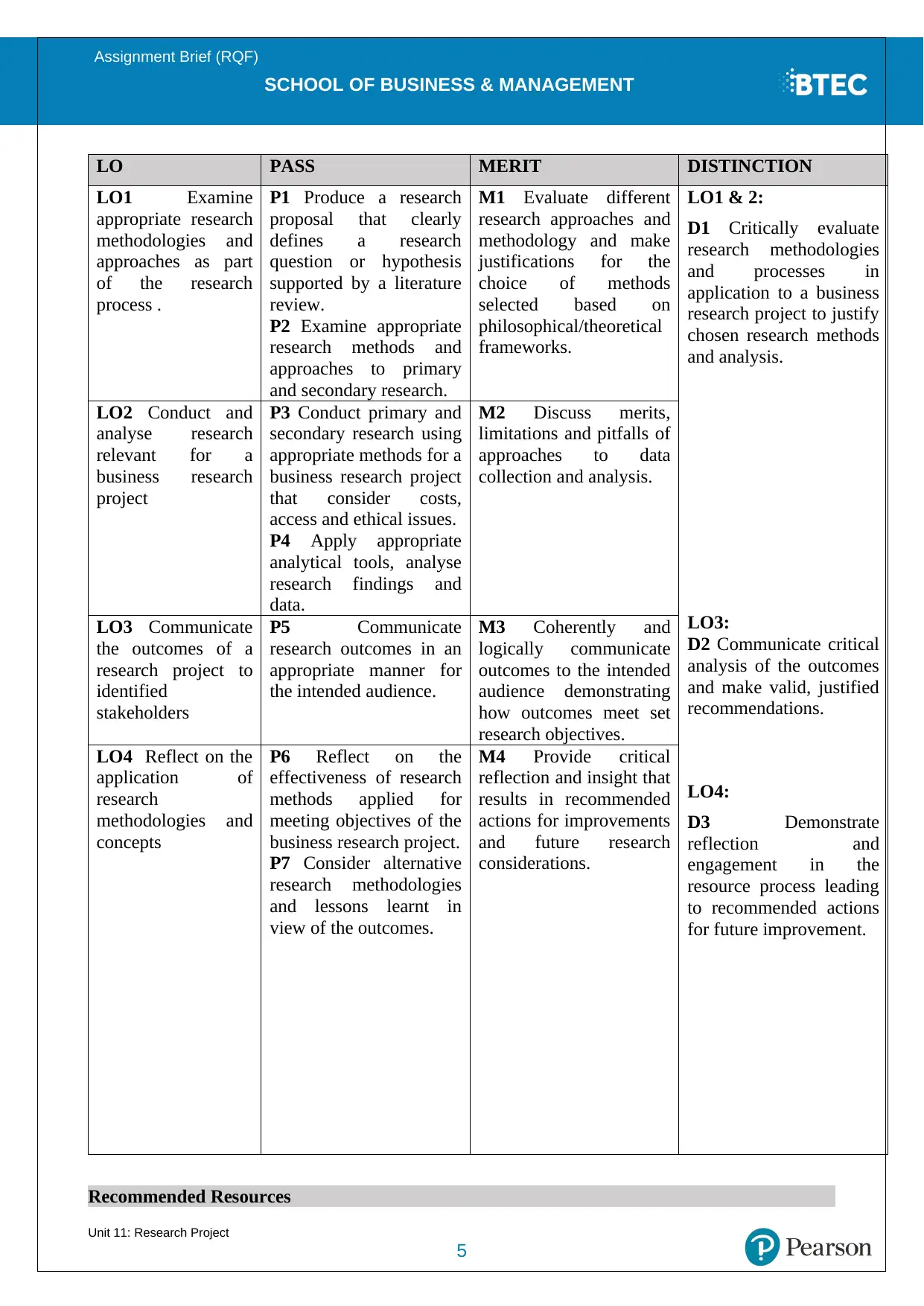
SCHOOL OF BUSINESS & MANAGEMENT
Assignment Brief (RQF)
LO PASS MERIT DISTINCTION
LO1 Examine
appropriate research
methodologies and
approaches as part
of the research
process .
P1 Produce a research
proposal that clearly
defines a research
question or hypothesis
supported by a literature
review.
P2 Examine appropriate
research methods and
approaches to primary
and secondary research.
M1 Evaluate different
research approaches and
methodology and make
justifications for the
choice of methods
selected based on
philosophical/theoretical
frameworks.
LO1 & 2:
D1 Critically evaluate
research methodologies
and processes in
application to a business
research project to justify
chosen research methods
and analysis.
LO3:
D2 Communicate critical
analysis of the outcomes
and make valid, justified
recommendations.
LO4:
D3 Demonstrate
reflection and
engagement in the
resource process leading
to recommended actions
for future improvement.
LO2 Conduct and
analyse research
relevant for a
business research
project
P3 Conduct primary and
secondary research using
appropriate methods for a
business research project
that consider costs,
access and ethical issues.
P4 Apply appropriate
analytical tools, analyse
research findings and
data.
M2 Discuss merits,
limitations and pitfalls of
approaches to data
collection and analysis.
LO3 Communicate
the outcomes of a
research project to
identified
stakeholders
P5 Communicate
research outcomes in an
appropriate manner for
the intended audience.
M3 Coherently and
logically communicate
outcomes to the intended
audience demonstrating
how outcomes meet set
research objectives.
LO4 Reflect on the
application of
research
methodologies and
concepts
P6 Reflect on the
effectiveness of research
methods applied for
meeting objectives of the
business research project.
P7 Consider alternative
research methodologies
and lessons learnt in
view of the outcomes.
M4 Provide critical
reflection and insight that
results in recommended
actions for improvements
and future research
considerations.
Recommended Resources
Unit 11: Research Project
5
Assignment Brief (RQF)
LO PASS MERIT DISTINCTION
LO1 Examine
appropriate research
methodologies and
approaches as part
of the research
process .
P1 Produce a research
proposal that clearly
defines a research
question or hypothesis
supported by a literature
review.
P2 Examine appropriate
research methods and
approaches to primary
and secondary research.
M1 Evaluate different
research approaches and
methodology and make
justifications for the
choice of methods
selected based on
philosophical/theoretical
frameworks.
LO1 & 2:
D1 Critically evaluate
research methodologies
and processes in
application to a business
research project to justify
chosen research methods
and analysis.
LO3:
D2 Communicate critical
analysis of the outcomes
and make valid, justified
recommendations.
LO4:
D3 Demonstrate
reflection and
engagement in the
resource process leading
to recommended actions
for future improvement.
LO2 Conduct and
analyse research
relevant for a
business research
project
P3 Conduct primary and
secondary research using
appropriate methods for a
business research project
that consider costs,
access and ethical issues.
P4 Apply appropriate
analytical tools, analyse
research findings and
data.
M2 Discuss merits,
limitations and pitfalls of
approaches to data
collection and analysis.
LO3 Communicate
the outcomes of a
research project to
identified
stakeholders
P5 Communicate
research outcomes in an
appropriate manner for
the intended audience.
M3 Coherently and
logically communicate
outcomes to the intended
audience demonstrating
how outcomes meet set
research objectives.
LO4 Reflect on the
application of
research
methodologies and
concepts
P6 Reflect on the
effectiveness of research
methods applied for
meeting objectives of the
business research project.
P7 Consider alternative
research methodologies
and lessons learnt in
view of the outcomes.
M4 Provide critical
reflection and insight that
results in recommended
actions for improvements
and future research
considerations.
Recommended Resources
Unit 11: Research Project
5
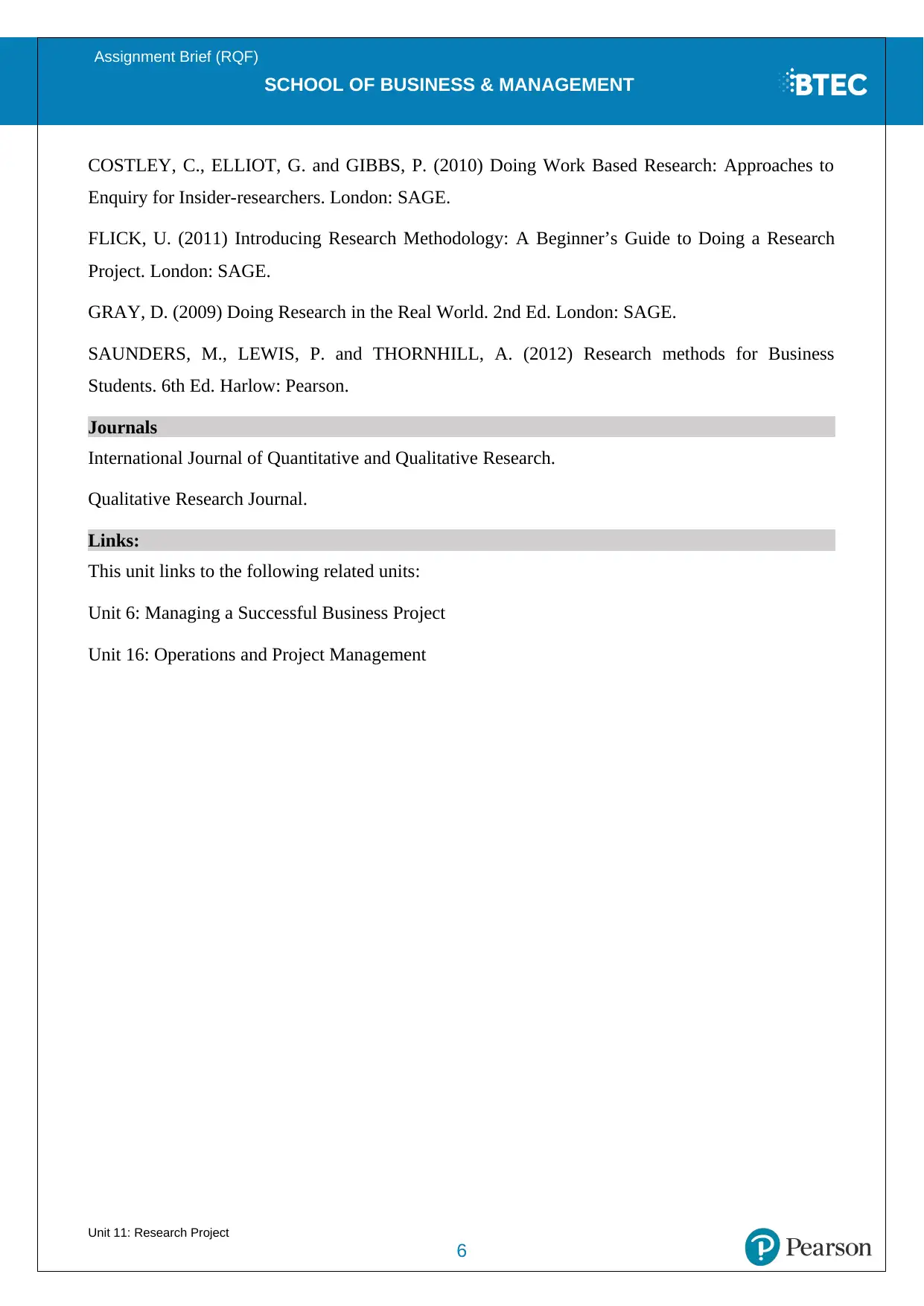
SCHOOL OF BUSINESS & MANAGEMENT
Assignment Brief (RQF)
COSTLEY, C., ELLIOT, G. and GIBBS, P. (2010) Doing Work Based Research: Approaches to
Enquiry for Insider-researchers. London: SAGE.
FLICK, U. (2011) Introducing Research Methodology: A Beginner’s Guide to Doing a Research
Project. London: SAGE.
GRAY, D. (2009) Doing Research in the Real World. 2nd Ed. London: SAGE.
SAUNDERS, M., LEWIS, P. and THORNHILL, A. (2012) Research methods for Business
Students. 6th Ed. Harlow: Pearson.
Journals
International Journal of Quantitative and Qualitative Research.
Qualitative Research Journal.
Links:
This unit links to the following related units:
Unit 6: Managing a Successful Business Project
Unit 16: Operations and Project Management
Unit 11: Research Project
6
Assignment Brief (RQF)
COSTLEY, C., ELLIOT, G. and GIBBS, P. (2010) Doing Work Based Research: Approaches to
Enquiry for Insider-researchers. London: SAGE.
FLICK, U. (2011) Introducing Research Methodology: A Beginner’s Guide to Doing a Research
Project. London: SAGE.
GRAY, D. (2009) Doing Research in the Real World. 2nd Ed. London: SAGE.
SAUNDERS, M., LEWIS, P. and THORNHILL, A. (2012) Research methods for Business
Students. 6th Ed. Harlow: Pearson.
Journals
International Journal of Quantitative and Qualitative Research.
Qualitative Research Journal.
Links:
This unit links to the following related units:
Unit 6: Managing a Successful Business Project
Unit 16: Operations and Project Management
Unit 11: Research Project
6
1 out of 6
Related Documents
Your All-in-One AI-Powered Toolkit for Academic Success.
+13062052269
info@desklib.com
Available 24*7 on WhatsApp / Email
![[object Object]](/_next/static/media/star-bottom.7253800d.svg)
Unlock your academic potential
© 2024 | Zucol Services PVT LTD | All rights reserved.





